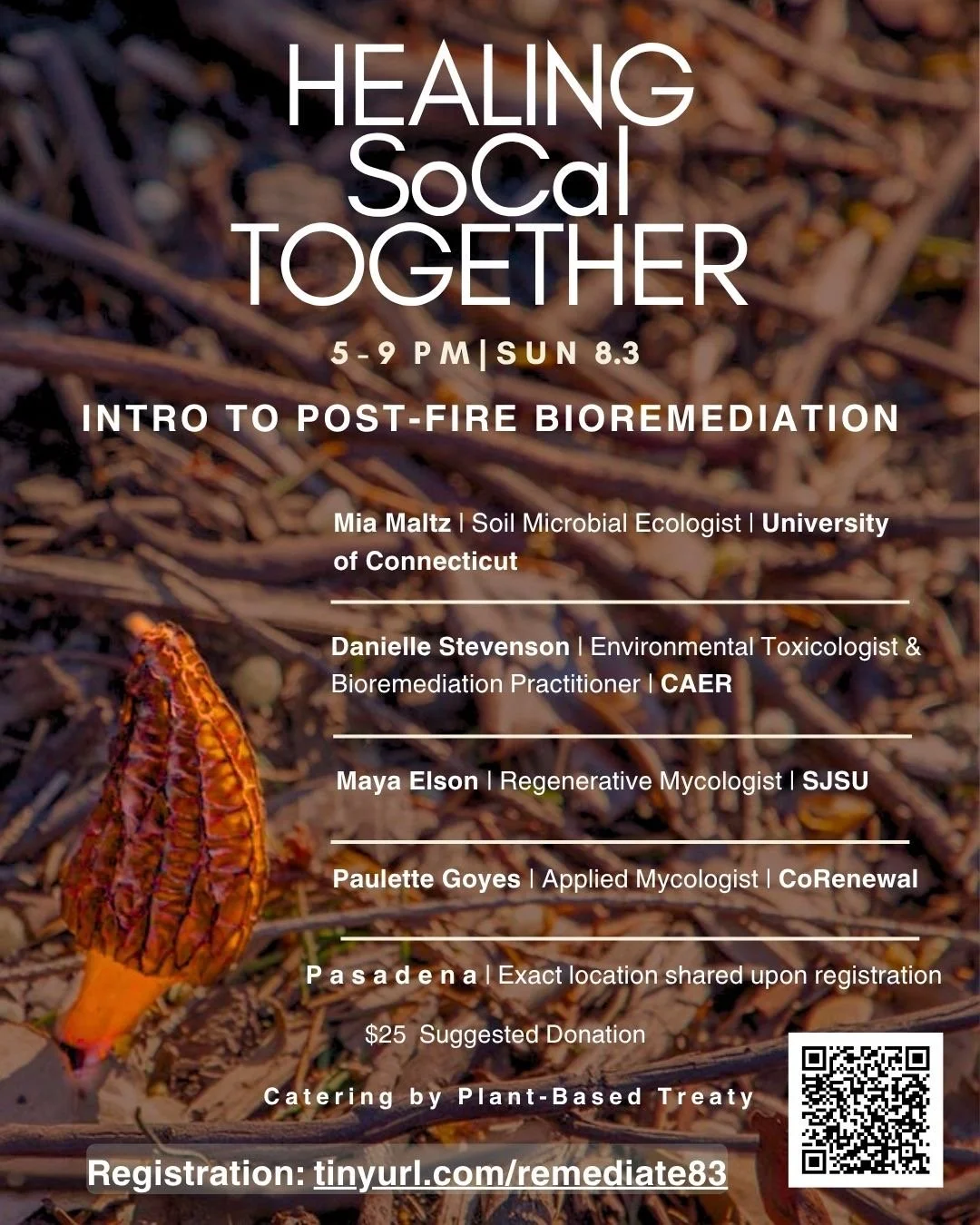Healing SoCal Together: Bioremedation Training
We’re partnering with CoRenewal, SoCal Post Fire Bioremediation Coalition, MyceliumMatters, Altadena Soil Collective, Resilient Palisades and several community partners from around Southern California to offer a training series for post-fire bioremediation techniques.
Join leading scientists, mycologists, and practitioners including Dr. Mia Maltz, Dr. Danielle Stevenson, Maya Elson, and Paulette Goyes for an intensive deep dive into post-fire bioremediation. This is a unique opportunity to learn directly from pioneers at the forefront of restoring soil and water health with an integrated approach incorporating phytoremediation and mycoremediation techniques.
This in-depth training will be an opportunity to learn from and engage with a collective of scientists, mycologists, environmental advocates and community organizers dedicated to healing the fire-impacted landscapes of Los Angeles, Altadena and the Southern California region.
Empower yourself and your community by learning how to engage with the impacts of fire upon soil and water. Gain understanding of soil sampling, site assessments, test outcomes, innovative bioremediation approaches to mitigate toxins, interactions between soil, plants, microbes and fungi, post-fire hydrogeology, and how to proceed with restoring soil health to benefit your home site, local community and the broader ecosystem.
We will have presentations and Q&A with bioremediation practitioners and researchers at the leading edge of the research, offering their insight and wisdom as they prepare to launch a training program for post-fire bioremediation.
Topics to be covered include:
Contaminants of concern after fire
Safety and hazardous materials
Fire impacts on soil and water
Bioremediation foundations
Basic fungal biology
Interpreting soil test results
Interactions between soil, plants, microbes and fungi, soil microbial community dynamics, etc.)
Soil and water (hydrogeology) considerations post-fire
Environmental engineer (permits/regulations) for remediation
Remediation types
Past studies on post fire remediation
Practical tools: Site assessments, Soil Sampling, Using & Interpreting XRF, Wattles & other soil interventions
Mia Maltz | CoRenewal
Mia Maltz is a soil microbial ecologist working at the interface of community ecology, biogeography, and mycology. Her work broadly focuses on community responses to disturbance, which feedback to influence plant and fungal community structure and ecosystem functioning. Maltz studied at the University of California, Irvine where she received my Ph.D. in Ecology and Evolutionary Biology, with an emphasis on Ecological Restoration and Fungi. Her dissertation work in Kathleen Treseder’s Lab of Fungi, Ecosystems, and Global Change looked at the effects of ecosystem degradation on fungal community composition and function. Specifically, she evauated which restoration techniques affect fungi along with methods for restoring mycorrhizal fungal function within degraded landscapes. Maltz was a UC President’s Postdoctoral Fellow in the Division of Biomedical Sciences at UC Riverside between 2020 and 2023. Her research overall focuses on fungal communities and functional ecology in novel ecosystems, including pumice plains, drying lakebeds, and the lung mycobiome.
Danielle Stevenson I Centre for Applied Ecological Remediation (CAER)
Dr. Danielle Stevenson is an environmental toxicologist and applied mycologist dedicated to advancing research and application into fungal soil and waste remediation. With over a decade of experience in bioremediation research and community-based environmental health initiatives, she specializes in the use of fungi to degrade pollutants and restore contaminated ecosystems. Danielle’s work bridges science, practice, and policy, with a focus on building partnerships across communities, academia, and government. Her PhD research identified effective plant-fungi combinations for cleaning up polluted sites and launched a youth training program now expanding nationally.
Paulette Goyes I UCONN
Paulette Goyes is part of Dr. Mia Malt'z’s mycology lab at University of Connecticut’s Plant Science and Landscape Architecture department.
Maya Elson I Regenerative Mycologist | SJSU
Maya Elson is a teacher, naturalist, mycologist, organizer and lover of the wild. Maya was the Executive Director of CoRenewal from 2016-2021, where she works to enact effective and just solutions to environmental and social crises by working in collaboration with fungi. She is the co-founder and Program Coordinator of the Post Fire Biofiltration Initiative, an effort and experiment using fungi to prevent toxins from burned homes from entering waterways. Maya is one of the founding members of the Radical Mycology network, and has started Applied Mycology groups in Olympia, WA and the San Francisco Bay area. She’s worked as a campaign organizer with a number of climate justice and wilderness defense struggles over many years. Since 2006, Maya has been spent supporting youth in finding their place in their ecological and human communities by working with Wild Child Santa Cruz, Gaia Passages, and other programs. She has been regularly leading mushroom foraging trips for adults for over 4 years. She holds a Graduate Certificate in Ecopsychology, and weaves together human and ecological remediation through her work teaching Mycopermaculture, Fungal Biology, Mycorenewal and Mushroom Identification.
Food will be provided by Plant Based Treaty.
Donations support travel costs and presenter stipends, as well as the development of a post-fire bioremediation training program to be offered to community in Southern California.
Please email info@caer.earth if you need a no-cost or discounted ticket.
